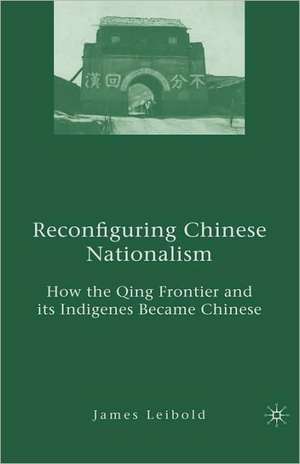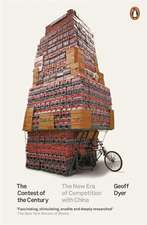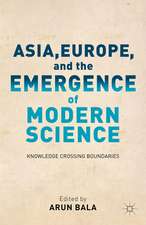Reconfiguring Chinese Nationalism: How the Qing Frontier and its Indigenes Became Chinese
Autor J. Leibolden Limba Engleză Hardback – 28 ian 2008
Preț: 779.40 lei
Preț vechi: 950.49 lei
-18% Nou
Puncte Express: 1169
Preț estimativ în valută:
149.16€ • 155.15$ • 123.14£
149.16€ • 155.15$ • 123.14£
Carte tipărită la comandă
Livrare economică 14-28 aprilie
Preluare comenzi: 021 569.72.76
Specificații
ISBN-13: 9781403974792
ISBN-10: 1403974799
Pagini: 288
Ilustrații: XI, 271 p.
Dimensiuni: 140 x 216 x 24 mm
Greutate: 0.52 kg
Ediția:2008
Editura: Palgrave Macmillan US
Colecția Palgrave Macmillan
Locul publicării:New York, United States
ISBN-10: 1403974799
Pagini: 288
Ilustrații: XI, 271 p.
Dimensiuni: 140 x 216 x 24 mm
Greutate: 0.52 kg
Ediția:2008
Editura: Palgrave Macmillan US
Colecția Palgrave Macmillan
Locul publicării:New York, United States
Cuprins
From Empire to Nation: The Bounding of the Chinese Geo-body PART I: STRATEGIES OF POLITICAL INTERVENTION Borderlands of State Power: The Nationalists and the Frontier Question Domesticating Minzu: The Communists and the National Question PART II: NARRATIVES OF CULTURAL INNOVATION From the Yellow Emperor to Peking Man: The Nationalists and the Construction of the Zhonghua minzu Han Man's Burden: The Communists and the Construction of the Zhonghua minzu
Recenzii
"The shibboleth of Chinese homogeneity is slowly but surely crumbling before the assault of a growing body of work on the place of the non-Han peoples in the modern Chinese state. James Leibold's informative study is a worthy contribution to this scholarship;he brings a critical edge to his consideration of a significant body of writing by early- and mid-twentieth century figures...The book is fluidly written and well produced." - Mark C. Elliott, American Historical Review
"Recommended." - CHOICE
'Reconfiguring Chinese Nationalism provides students of modern history with a valuable comparative framework from which to examine differences in nation-state formation; it offers a place at the table for those on the periphery who have been marginalized from the 'center' of the history of nation-state formation; and finally, it prods students of twentieth-century China to rethink the role of political and intellectual elites in shaping modern China. Reconfiguring Chinese Nationalism is an insightful, well-argued analysis that historians and social scientists of early-twentieth-century China will find indispensable.' John Herman, The Historian
"What makes James Leibold's book an important contribution to scholarship is not that it provides a grand narrative of how China transitioned from an empire to a modern nation-state; rather, what it offers is an original and sensitive discussion of 'how the vast Qing empire became "Chinese"' . . .A major strength of Leibold's study is its conceptual clarity; it has succeeded in helping us better understand the efforts and legacies on the part of Republican-era elites in the construction of 'China' and 'Chineseness.'" - Leo K. Shin, China Information"This is a smart, well-informed, and important book. By challenging previous studies that focus on the crisis of self-identification associated with anti-colonial sentiment, Reconfiguring Chinese Nationalism redirects our gaze to the margins of historical China and compels us to acknowledge the role played by the 'familiar others' of China's inland frontiers in shaping modern Chinese identities. This pioneering book offers the first comprehensive account in English of frontier policy and nation-building in early 20th century China." - John Fitzgerald, author of Awakening China: Politics, Culture, and Class in the Nationalist Revolution
"Reconfigurating Chinese Nationalism is a groundbreaking work in the study of Chinese nationalism. Rather than focusing on how Han Chinese constructed their national identity, the author examines the roles that minority races in borderlands played in the Chinese discourse of the nation. In so doing, the author not only complicates the picture of Chinese nationalism, but also sheds new light on the history of twentieth-century China." - Tze-ki Hon, Associate Professor of History, SUNY-Geneseo
"In this well-documented and provocative study, Leibold details the claims made by 20th century Chinese political elites (both the Guomindang and the Communist Party) to national status for the entire territory of the defunct Qing empire, including its enormous and ethnically diverse margins (Tibet, Xinjiang, Mongolia, Manchuria). By focusing on the central state and its leaders, he complements recent work on the frontiers themselves to enhance our understanding of the nation-building process in modern China. In the process, he drastically reduces the (often ideologically imposed) differences historians have identified between the political parties and demonstrates their common nationalist program - to make China out of the Qing. Both parties constructed a Zhonghua minzu, an imaginary cultural-political-racial community, in which unity overrode diversity for national purposes in a period of intense anxiety about China's ability to continue as a unified country." - Jonathan Lipman, Mount Holyoke College
"Reconfiguring the Chinese Nation: How the Qing Frontier and Its Indigenes Became Chinese is the first book to comprehensively address China's transition from empire to nation-state during the late Qing and Republican eras . . .Leibold has accomplished his purpose of demystifying the Chinese nation. In doing so, he has not only filled an important gap in understanding modern Chinese nationalism, but also successfully challenges many existing notions about the Chinese nation and policies of major 20th-century political parties. This book adds a substantive new voice to the scholarly discussion of modern Chinese nation-building; a must-read . . ." - Yufeng Mao, Washington University in St. Louis
"Recommended." - CHOICE
'Reconfiguring Chinese Nationalism provides students of modern history with a valuable comparative framework from which to examine differences in nation-state formation; it offers a place at the table for those on the periphery who have been marginalized from the 'center' of the history of nation-state formation; and finally, it prods students of twentieth-century China to rethink the role of political and intellectual elites in shaping modern China. Reconfiguring Chinese Nationalism is an insightful, well-argued analysis that historians and social scientists of early-twentieth-century China will find indispensable.' John Herman, The Historian
"What makes James Leibold's book an important contribution to scholarship is not that it provides a grand narrative of how China transitioned from an empire to a modern nation-state; rather, what it offers is an original and sensitive discussion of 'how the vast Qing empire became "Chinese"' . . .A major strength of Leibold's study is its conceptual clarity; it has succeeded in helping us better understand the efforts and legacies on the part of Republican-era elites in the construction of 'China' and 'Chineseness.'" - Leo K. Shin, China Information"This is a smart, well-informed, and important book. By challenging previous studies that focus on the crisis of self-identification associated with anti-colonial sentiment, Reconfiguring Chinese Nationalism redirects our gaze to the margins of historical China and compels us to acknowledge the role played by the 'familiar others' of China's inland frontiers in shaping modern Chinese identities. This pioneering book offers the first comprehensive account in English of frontier policy and nation-building in early 20th century China." - John Fitzgerald, author of Awakening China: Politics, Culture, and Class in the Nationalist Revolution
"Reconfigurating Chinese Nationalism is a groundbreaking work in the study of Chinese nationalism. Rather than focusing on how Han Chinese constructed their national identity, the author examines the roles that minority races in borderlands played in the Chinese discourse of the nation. In so doing, the author not only complicates the picture of Chinese nationalism, but also sheds new light on the history of twentieth-century China." - Tze-ki Hon, Associate Professor of History, SUNY-Geneseo
"In this well-documented and provocative study, Leibold details the claims made by 20th century Chinese political elites (both the Guomindang and the Communist Party) to national status for the entire territory of the defunct Qing empire, including its enormous and ethnically diverse margins (Tibet, Xinjiang, Mongolia, Manchuria). By focusing on the central state and its leaders, he complements recent work on the frontiers themselves to enhance our understanding of the nation-building process in modern China. In the process, he drastically reduces the (often ideologically imposed) differences historians have identified between the political parties and demonstrates their common nationalist program - to make China out of the Qing. Both parties constructed a Zhonghua minzu, an imaginary cultural-political-racial community, in which unity overrode diversity for national purposes in a period of intense anxiety about China's ability to continue as a unified country." - Jonathan Lipman, Mount Holyoke College
"Reconfiguring the Chinese Nation: How the Qing Frontier and Its Indigenes Became Chinese is the first book to comprehensively address China's transition from empire to nation-state during the late Qing and Republican eras . . .Leibold has accomplished his purpose of demystifying the Chinese nation. In doing so, he has not only filled an important gap in understanding modern Chinese nationalism, but also successfully challenges many existing notions about the Chinese nation and policies of major 20th-century political parties. This book adds a substantive new voice to the scholarly discussion of modern Chinese nation-building; a must-read . . ." - Yufeng Mao, Washington University in St. Louis
Notă biografică
JAMES LEIBOLD is Lecturer in Asian Studies, La Trobe University, Melbourne, Australia















